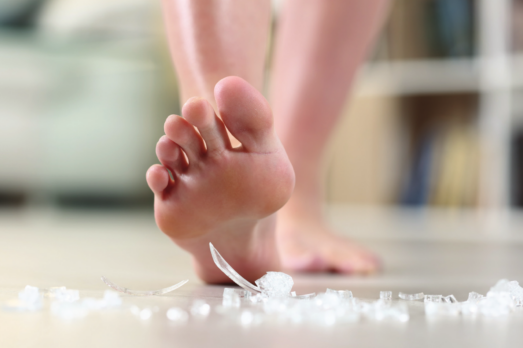
Stepping barefoot on a small sliver of glass may only hurt a minute but don’t minimize a puncture wound.
Puncture wounds are different than cuts. A puncture has a small entry hole caused by a pointed object while a cut is an open wound where the skin is torn. Puncture wounds require different treatment than cuts because the tiny holes may harbor foreign matter under the skin such as dirt or debris from the sharp object.
The severity of a puncture depends on how deep it is. Deeper punctures are more likely to penetrate further into tissue and possibly cause more damage. The type of sharp object and its relative cleanliness also matter. The dirtier the object, such as a rusty nail, the more dirt and debris can enter the wound and increase the likelihood of infection.
Even though puncture wounds are common in the foot, too often, they are inadequately treated. It is best to seek proper medical care within the first 24 hours to ensure anything that might be embedded in the wound is removed.
Treatment involves a thorough cleaning to extract any foreign matter. In some cases, an X-ray may be ordered to determine if any debris remains in the wound or if bone has been damaged. Anything that lingers in the wound increases your chance of a serious infection developing and spreading.
Tetanus shots are administered if needed, and following treatment, the wound should be monitored carefully at home.
It is important to keep any dressings dry and weight off of the injured foot. If the wound remains red, swollen or sore after a few days, return to your doctor for further treatment.
Infection is a common complication of puncture wounds. With the increasing prevalence of drug-resistant bacteria, even healthy people are at risk of contracting a potentially life-threatening staph infection. If you step on something and puncture the skin, get treated right away.
For more information on puncture wounds or if you are experiencing foot problems, contact Wentz Foot & Ankle Specialists at 719-539-6600.
Dr. Ralph Wentz is a board-certified foot and ankle surgeon in Salida and a fellow of the American College of Foot and Ankle Surgeons.
For more information on foot and ankle injuries or to schedule an exam, contact Wentz Foot & Ankle Specialists at 719-539-6600.
Dr. Ralph Wentz is a board-certified foot and ankle surgeon in Salida and a fellow of the American College of Foot and Ankle Surgeons.
